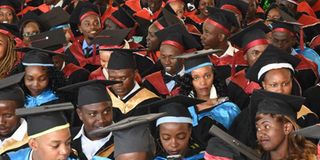State backs new plan to triple University fees

A past graduation ceremony at Moi University in Eldoret.
What you need to know:
- University dons want funding to be based on a differentiated Unit Cost (DUC).
- The policy change requires Cabinet and parliamentary approval.
You will soon pay more for university education after the government backed a recommendation to increase fees by up to three times.
Vice chancellors want undergraduate students to pay Sh48,000, up from Sh16,000 annually, and the National Treasury as well as the Education ministry backed the proposal during a meeting with MPs on Wednesday.
The policy change requires Cabinet and parliamentary approval, but it has higher prospects of passing in the House — most likely next year — as a government-backed agenda and given the financial crises universities have plunged into.
Universities owe a staggering Sh37.3 billion in statutory deductions. The accrued funds are for the Kenya Revenue Authority (KRA), Pension Scheme dues, Insurance Premiums, Sacco contributions, NHIF and NSSF.
Treasury PS Julius Muia and Higher Education PS Simon Nabukwesi acknowledged that universities are facing a financial crisis and the current fees should be reviewed.
Public universities vice chancellors’ committee chair Prof Geoffrey Muluvi told MPs the current fees was set in 1989 and has never been revised.
“It was estimated that the average cost for a student to study in university was Sh120,000, the figure was comprised of Sh86,000 to cover tuition while Sh34,000 was for student upkeep, including stationery,” Dr Muluvi told the National Assembly Education committee chaired by Busia Woman Representative Florence Mutua.
The government has been paying Sh70,000 while students pay Sh16,000. He, however, said the current cost per student has shot up to Sh254,644.
The vice chancellors said as fees are raised from Sh16,000 to Sh48,000 per year, the Higher Education Loans Board (Helb) should be adequately funded to provide additional support to needy students to cushion them from the adverse effects of the increment.
The dons want funding to be based on a differentiated Unit Cost (DUC).
Universities funding board
The varsity chiefs want funding of universities to be rationalised and be based on average student unit costs or a factor to be decided by universities funding board in consultation with other stakeholders.
Dr Muluvi said the funding, as determined in the report of the vice chancellors committee, ranged from Sh144,000 for humanities and social sciences to Sh720,000 for dentistry at clinical level.
Mr Muia told the MPs the Education ministry should undertake comprehensive reforms to ensure public universities address the current financial crisis they are facing.
“The National Treasury will endeavor to provide more resources after engaging with the ministry and individual universities.”
Mr Nabukwesi said public universities are facing a huge financial crisis.
“To ensure students do not struggle to pay the new fees rates, vice chancellors have proposed that Helb increases student loans to a minimum of Sh68,000.
“If the amount is increased, students will bear with the burden of the increased fees,” he said.
Private universities vice chancellors’ committee chairman Prof Kisau Mumo said there is need to review the fees paid by government-sponsored students admitted in private universities.
“The number of students joining private universities has increased from 6,312 in 2016/20 to 61,237 in 2020/21, hence the need to increase funding for private universities,” said Prof Mumo
Helb CEO Charles Ringera said the funds for student loans should be increased to benefit more learners.
“If the proposed fee increase is adopted, Helb will require additional funding to support needy students,” he said.
Mr Rigera said, the average loan allocation in the current financial year is Sh37,000 per student per year, down from Sh45,000 the previous year.





